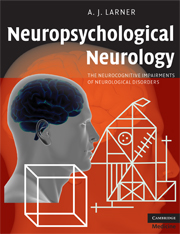Book contents
- Frontmatter
- Contents
- Acknowledgements
- Introduction
- 1 Cognitive function, neuropsychological evaluation, and syndromes of cognitive impairment
- 2 Neurodegenerative disorders
- 3 Cerebrovascular disease: vascular dementia and vascular cognitive impairment
- 4 The epilepsies
- 5 Neurogenetic disorders
- 6 Inflammatory, immune-mediated, and systemic disorders
- 7 Structural brain lesions
- 8 Endocrine, metabolic, and toxin-related disorders
- 9 Infective disorders
- 10 Neuromuscular disorders
- Index
- References
8 - Endocrine, metabolic, and toxin-related disorders
Published online by Cambridge University Press: 15 December 2009
- Frontmatter
- Contents
- Acknowledgements
- Introduction
- 1 Cognitive function, neuropsychological evaluation, and syndromes of cognitive impairment
- 2 Neurodegenerative disorders
- 3 Cerebrovascular disease: vascular dementia and vascular cognitive impairment
- 4 The epilepsies
- 5 Neurogenetic disorders
- 6 Inflammatory, immune-mediated, and systemic disorders
- 7 Structural brain lesions
- 8 Endocrine, metabolic, and toxin-related disorders
- 9 Infective disorders
- 10 Neuromuscular disorders
- Index
- References
Summary
Endocrine disorders
Diabetes mellitus
A link between diabetes mellitus per se and cognitive decline may be obscured by comorbid cerebrovascular disease (both microvascular and macrovascular), hypertension, or depression (Messier, 2005), since these conditions may confound any assessment of cognitive performance. Nonetheless, a meta-analysis of studies of cognitive performance in type 1 diabetes found evidence for slowing of mental speed and diminished mental flexibility with sparing of learning and memory (Brands et al., 2005). Systematic reviews have shown a greater risk and rate of cognitive functional decline (Cukierman et al., 2005) and of dementia (Biessels et al., 2006) in diabetes, with processing speed and verbal memory the domains most affected (Messier, 2005). Diabetes does not appear to be a risk factor for the development of Alzheimer's disease overall, but might increase relative risk in certain subgroups (Akomolafe et al., 2006).
Epidemiological studies provide some evidence that cognition may be impaired in the early stages of type 2 diabetes. In the Whitehall II study, a prospective study of the incidence of diabetes, an association was noted between diabetes and poor performance on a test of inductive reasoning (Alice Heim 4) in stroke-free patients, but verbal memory, verbal meaning, and verbal fluency tests were not affected. The study suggested that effects of diabetes on cognitive performance may be evident within 5 years of diagnosis (Kumari & Marmot, 2005). Hence, cognitive dysfunction is one of the chronic complications of diabetes, but the pathophysiology is uncertain.
- Type
- Chapter
- Information
- Neuropsychological NeurologyThe Neurocognitive Impairments of Neurological Disorders, pp. 188 - 203Publisher: Cambridge University PressPrint publication year: 2008



